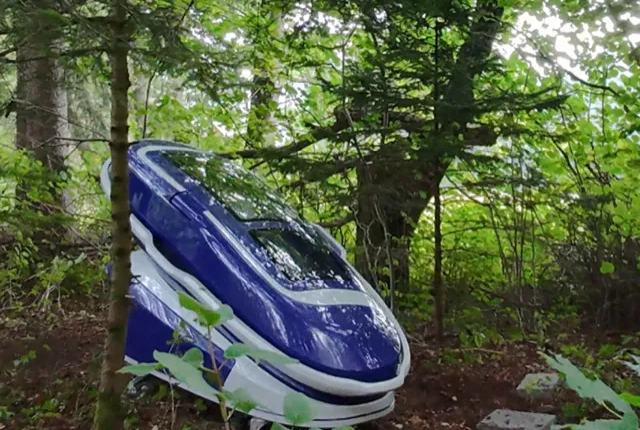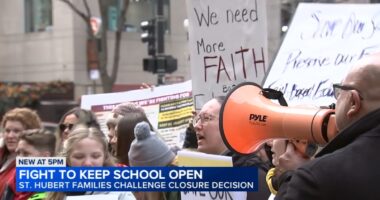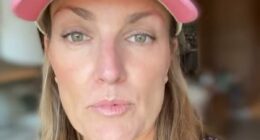Share this @internewscast.com
THE inventor of the controversial Sacro “suicide pod” has pledged to introduce the death device to the UK, even though it is under scrutiny due to the alleged murder of a woman.
It comes as MPs on Friday passed a landmark assisted dying bill in a knife-edge final vote.
Terminally ill adults are set to be given the legal right to end their lives.
The decision paves the way for the biggest shake-up in end-of-life care in decades after weeks of furious lobbying on both sides.
The Bill now moves to the House of Lords for further scrutiny before it can become law.
If approved, it would permit adults in England and Wales with less than six months to live to apply for a medically assisted death, under stringent conditions.
Dr Philip Nitschke, who invented the bizarre-looking Sacro pod used in assisted dying, said he hoped to use the device in the UK.
It is a human-sized pod which replaces the oxygen inside it with nitrogen, causing death by hypoxia.
Dubbed the “Tesla of euthanasia”, it is self-operated by a button on the inside, providing death without medical supervision.
A camera inside records their final moments, and the video is handed to a coroner.
Dr. Nitschke remarked: “Once we are certain that the definitive legislation is established, we will eagerly begin exploring the possibility of utilizing the device in the UK.
“We’ll be looking to find UK-registered doctors to assist, and of course, someone who wants to use it and satisfies all of the requirements under the law.
“The doctors involved would know that this would attract attention and possible close scrutiny, which by and large most doctors aren’t enthusiastic about, so we’d have to find someone who’s a little crusading.”
Dr Nitschke invented the Sarco in 2012.
Last year, he developed a double pod that could be used by a couple who wish to die together, The Times reports.
He said: “If we were able to make use of the device available in the UK, there would be quite a few more applications, I imagine, because people want to die in their own home, or more importantly, be able to take the Sarco to some nice place in the UK rather than having to try and go to some strange country.”
The suicide pod activist started the process of assisted dying using the pod last year with The Last Resort organisation – an assisted dying group based in Switzerland.
However, the pod became the centre of an alleged murder investigation after the first woman to die inside it was allegedly found with strangulation marks on her neck.
The anonymous woman, 64 and identified as an American citizen, died last year inside the controversial capsule set up in a forest in Switzerland.
The woman is said to have initiated the dying process herself by pressing a button while lying in the pod in the middle of the forest.
What measures are included in the bill?
THE Assisted Dying Bill is one step closer to becoming law, meaning terminally ill adults are set to be given the legal right to end their lives.
But the Bill – which has undergone significant changes at each stage – doesn’t come without strict safeguards.
Many things have been stripped out, so what remains?
APPROVAL FROM DOCTORS AND AN EXPERT PANEL
When the Bill was originally proposed, it was planned that a High Court judge would have the final say in each and every case.
It comes after Labour’s Kim Leadbeater had dismissed warnings that judges couldn’t handle the cases due to scarce capacity, insisting her Bill would be the “most robust” in the world.
But Ms Leadbeater amended her legislation.
The last-minute tweak, proposed just hours before MPs began debating the Bill in February, sparked a backlash — throwing its future into doubt and turning former supporters cold.
However, applications will now need the approval of two doctors and a new expert panel.
This will be made up of a legal figure, psychiatrist and social worker — a key change from the original plan.
EATING DISORDERS
MPs accepted an amendment ruling out eligibility for anyone seeking to die solely due to stopping eating or drinking.
Ms Leadbeater stressed the Bill would exclude those with eating disorders.
It followed concern over the wording of the potential law would provide a loophole for those with anorexia to end their own lives.
The Liberal Democrat MP Sarah Olne tabled the amendment.
The Royal College of Psychiatrists also expressed concern over any people with mental disorders such as anxiety or depression using the Bill in a similar way.
END-OF-LIFE CARE
Another amendment requiring ministers to assess the impact on palliative care within a year also passed.
Charity Marie Curie warning this alone would not “make the improvements needed” in end-of-life care.
REFLECTION PERIOD
Some parts of the Bill have stayed the same, however.
Two doctors must be independently satisfied a person is eligible for assisted dying.
The medics must do their assessments at least seven days apart.
There must be a 14-day “reflection period” if the High Court decides the patient can undergo assisted dying.
If the two doctors are still satisfied once the period has been completed, the patients will be prescribed lethal drugs.
THE PAPERWORK
Brits who want to end their lives early must show have the mental capacity to make a choice about ending their life.
They must also be deemed to have expressed a clear, settled and informed wish, free from coercion or pressure.
If the patient can prove this, they will then have to make two separate declarations, witnessed and signed, saying they want to die.
WHAT IS IN THE BILL?
The Terminally Ill Adults (End of Life) Bill applies to those over 18, who are living in England or Wales, and have been registered with a GP for at least 12 months.
They must have the mental capacity to make the choice.
They must be informed and free from coercion or pressure before making the choice.
According to the Bill, they must have a terminal illness and be expected to die within six months.
It requires them to declare their wish twice, both witnessed and signed.
Two doctors must be satisfied that these requirements are met before the application is approved.
A doctor would prepare the substance being used to end the patient’s life, but the person would take it themselves.
Coercing someone into declaring they want to end their life will be illegal, with a possible 14-year prison sentence.
However, a forensic expert who checked her body shortly after she died found injuries near her neck that appeared similar to strangulation marks.
The American woman was reportedly terminally ill and had been dying for two years.
She was diagnosed with Osteomyelitis – a disease that could have manifested the alleged injury marks on her neck – according to Dutch media.
But her death raised a host of legal and ethical questions in Switzerland, where active euthanasia is banned but assisted dying has been legal for decades.
Cops took several people into custody, including Dr Florian Willet, the president of The Last Resort organisation.
The right-to-die activist, 47, took his own life.
He suffered a mental breakdown after being arrested by Swiss Police last year, according to Dr Nitschke.
As part of the probe, prosecutors investigated whether he strangled the woman, but that was ruled out.
Willet was released in December after being held in pre-trial detention for 70 days.
He reportedly died in Germany with the help of a specialist organisation, though it is not known exactly how he died.
YOU’RE NOT ALONE
EVERY 90 minutes in the UK, a life is lost to suicide.
It doesn’t discriminate, touching the lives of people in every corner of society – from the homeless and unemployed to builders and doctors, reality stars and footballers.
It’s the biggest killer of people under the age of 35, more deadly than cancer and car crashes.
And men are three times more likely to take their own life than women.
Yet it’s rarely spoken of, a taboo that threatens to continue its deadly rampage unless we all stop and take notice, now.
That is why The Sun launched the You’re Not Alone campaign.
The aim is that by sharing practical advice, raising awareness and breaking down the barriers people face when talking about their mental health, we can all do our bit to help save lives.
Let’s all vow to ask for help when we need it, and listen out for others… You’re Not Alone.
If you, or anyone you know, needs help dealing with mental health problems, the following organisations provide support:




















